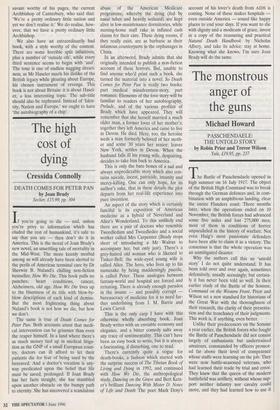Autobiography of a chip
Bruce Anderson
THE ENGLISH TRIBE by Stephen Haseler Macmillan, £40, £14.99, pp. 201 ational identity is a complex historical question, which can usefully be addressed only with a combination of great learning and synoptic boldness. Mr Haseler is cer- tainly bold: . . . there seems little doubt that we are coming to the end of the British story . . . European union . . . will inevitably . . . supplant the United Kingdom as the dominant political forum in which the shape and character of the lives of the peoples of the British Isles are determined.
Any writer who makes such an assertion lays claim to a profound understanding of the British people, their history and their future. So how does Mr Haseler vindicate his claim? Here are some examples of his knowledge of history:
The basic structures of. . . [an English] state created in feudal times have remained.
The Falklands War . . . was . . . virtually a joint exercise with the Americans.
The Union between England and Scotland . . . was settled on the battlefield, a product of bloodshed and force majeure.
Scotland and Wales were essentially colonised (by Southern English elites and their collaborators).
The Liberals almost succeeded in releasing the whole of Ireland from Britain in the 1920s, only to be thwarted by a last-minute military insurrection.
Thomas Hobbes . . . [was one of] the princi- pal theoretical advocates of the modern con- ception of individual freedom.
The visit to Wembley of the victorious 1956 Hungarian football team.
Thus does our author survey the centuries, 'Next year we exercise our minds.' bestowing egregious errors on all of them. (Who but Mr Haseler could conflate a football match and an uprising?) He cannot even use scissors and paste accurately. 'Robert Peel had a Brummie dialect', he informs us, while quoting his authority later: 'Sir Robert Peel . . . never disguised his Midlands speech.' To equate the Midlands speech of the late 18th and early 19th century with a Brummie dialect is a crass anachronism, but that is not a point which Mr Haseler could be expected to grasp. To recognise an anachronism requires a sense of chronology.
He is as negligent of the present as of the past: ' . . . the unique forms (and pomposi- ties) of British public life in the late 20th century — exhibited by the extravagances of.. . "the honourable and noble gentle- man", "the honourable and noble lady" '. Those phrases exist only in Mr Haseler's imagination, as does 'end of play', which is supposed to illustrate cricket terminology entering everyday usage.
We are not dealing only with cloth- earedness. Mr Haseler informs us that: 'By the mid 1990s it was clear that the UK nation-state had already been absorbed into a wider European polity.' He ought not to confuse his desires with others' clarity.
Anyone who believes that it is solely vul- gar Marxists who construct reductionist fantasies about British politics ought to read this book, where we are told that there is a `UK political establishment' and 'an established political class'. So who com- poses these homogeneous entities which rule our national life? On that, our author is silent. A writer who analyses British politics in these terms is not interested in analysing British politics.
But Mr Haseler has nobler goals in mind than mere analysis. He would like to rescue the British people from a false identity which has been thrust upon them by a public-school/landed/aristocratic elite — 'theme-park Englishness'. This is British history seen through the eyes of the BBC's drama department, and even they could construct a more coherent argument that Mr Haseler does. After informing us that theme-park Englishness is a
mental straitjacket which imposes itself upon the diversity and plurality of the real life of this country and its peoples,
he spends page after tedious page refuting himself by describing the very diversity and plurality which is supposed to have been straitjacketed.
But this book is not an argument: it is about Mr Haseler's obsessive hatred of the British upper classes. The obsessiveness may explain the repetition, remarkable in such a short book. Halifax on the Ameri- cans having all the money, but the British all the brains is quoted twice, fewer than 50 pages apart. There are three separate — and similar — discussions of Suez, but then Mr Haseler loves dwelling on British humiliations. In so doing, he quotes a savant worthy of his pages, the current Archbishop of Canterbury, who said that: 'We're a pretty ordinary little nation and yet we don't realise it.' We do realise, how- ever, that we have a pretty ordinary little Archbishop.
We also have an extraordinarily bad book, with a style worthy of the content. There are some horrible split infinitives, plus a number of 'outside ofs', while every third sentence seems to begin with 'and'. The tone is one of endless nagging dreari- ness, as Mr Haseler snarls his dislike of the British legacy while gloating about Europe, his chosen instrument of revenge. This book is not about Britain: it is about Hasel- er, a less interesting topic. The sub-title should also be rephrased. Instead of 'Iden- tity, Nation and Europe,' we ought to have 'the autobiography of a chip'.



























































 Previous page
Previous page